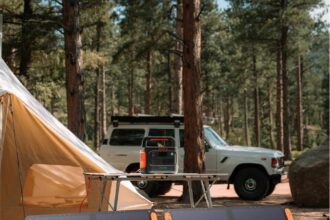Traveling in an RV offers a unique blend of freedom and adventure, allowing you to explore new places while enjoying the comforts of home. However, one of the challenges that modern RVers face is staying connected to the internet while on the road. Whether you need to check emails, work remotely, stream your favorite shows, or simply stay in touch with loved ones, reliable internet access is essential. Fortunately, there are several options available to ensure you remain connected no matter where your travels take you. In this guide, we’ll explore the best internet options for RVers and how to choose the right one for your needs.
When you’re searching for the perfect RV, such as those offered by Vogt RV or looking at an Airstream for sale, it’s important to consider how you’ll stay connected during your travels. Reliable internet can enhance your RV experience, making it easier to navigate routes, find local attractions, and stay in touch with family and friends. Here are the top internet options for RVers:
1. Mobile Hotspots
Mobile hotspots are a popular choice for RVers due to their portability and ease of use. These devices connect to cellular networks and provide a Wi-Fi signal that multiple devices can use. Major carriers like Verizon, AT&T, and T-Mobile offer mobile hotspot plans that can suit various data needs.
- Advantages:
- Portability: Easy to carry and set up anywhere.
- Flexibility: Can be used inside and outside the RV.
- Multiple devices: Can connect multiple devices simultaneously.
- Considerations:
- Data limits: Be mindful of data caps and overage charges.
- Coverage: Check the coverage map of your chosen carrier to ensure service in your travel areas.
2. Cellular Data Plans
Using your smartphone’s cellular data plan is another convenient way to access the internet on the road. Most smartphones can be turned into a mobile hotspot, sharing their internet connection with other devices.
- Advantages:
- Convenience: No additional devices needed.
- Cost-effective: Utilize your existing phone plan.
- Considerations:
- Data usage: Streaming and heavy internet use can quickly consume your data allowance.
- Battery drain: Using your phone as a hotspot can drain its battery quickly.
3. Satellite Internet
Satellite internet is ideal for RVers who frequently travel to remote areas where cellular coverage may be limited or non-existent. Companies like HughesNet and Starlink offer satellite internet services designed for mobile use.
- Advantages:
- Coverage: Available virtually anywhere, including remote locations.
- Independence: Not reliant on cellular networks.
- Considerations:
- Cost: Generally more expensive than other options.
- Installation: Requires a satellite dish and proper setup.
- Latency: Higher latency compared to cellular and Wi-Fi, which may affect activities like online gaming or video calls.
4. RV Park Wi-Fi
Many RV parks and campgrounds offer Wi-Fi as part of their amenities. While this can be a convenient option, the quality and reliability of the connection can vary greatly.
- Advantages:
- Cost: Often included in the campground fees.
- Convenience: Easy to connect once parked.
- Considerations:
- Speed and reliability: Shared networks can be slow, especially during peak times.
- Security: Public Wi-Fi networks can be less secure.
5. Public Wi-Fi
Public Wi-Fi networks are available in many places, including restaurants, libraries, and retail stores. While this can be a good supplementary option, it’s not a reliable primary source of internet.
- Advantages:
- Free or low-cost: Public Wi-Fi is often free to use.
- Availability: Found in many locations.
- Considerations:
- Security: Public networks are vulnerable to security risks.
- Availability: Not always accessible from your RV.
Choosing the Right Option
When selecting the best internet option for your RV travels, consider the following factors:
- Travel Locations: If you frequently travel to remote areas, satellite internet may be your best option. For urban and suburban travels, mobile hotspots and cellular data plans are usually sufficient.
- Data Needs: Determine how much data you typically use. Streaming videos, online gaming, and remote work require more data than casual browsing and email.
- Budget: Consider the initial setup costs and ongoing monthly fees. Mobile hotspots and cellular data plans tend to be more affordable than satellite internet.
- Convenience: Assess how easy it is to set up and use the internet option. Mobile hotspots and cellular data are generally straightforward, while satellite internet requires more effort.
Enhancing Your RV Internet Experience
To get the most out of your RV internet setup, consider these additional tips and tools:
- Signal Boosters: Cellular signal boosters can enhance weak signals, improving your connection quality in areas with poor coverage. Brands like WeBoost offer models specifically designed for RVs.
- Wi-Fi Extenders: These devices can extend the range of weak Wi-Fi signals, making it easier to connect when you’re parked far from the source.
- Data Management: Monitor your data usage to avoid overage charges and throttling. Many carriers offer apps to help you track your usage.
- Security Measures: Use a Virtual Private Network (VPN) to protect your data when using public Wi-Fi networks. Ensure your devices have up-to-date antivirus software.
Conclusion
Staying connected on the road is crucial for today’s RVers, and with the right internet option, you can enjoy reliable access no matter where your adventures take you. Whether you choose a mobile hotspot, cellular data plan, satellite internet, or rely on RV park Wi-Fi, each option has its advantages and considerations. When planning your travels and searching for your ideal RV, such as those available at Vogt RV or when looking at an Airstream for sale, make sure to factor in your internet needs to ensure a smooth and enjoyable journey. With the right setup, you can explore the open road without sacrificing your connection to the digital world.




